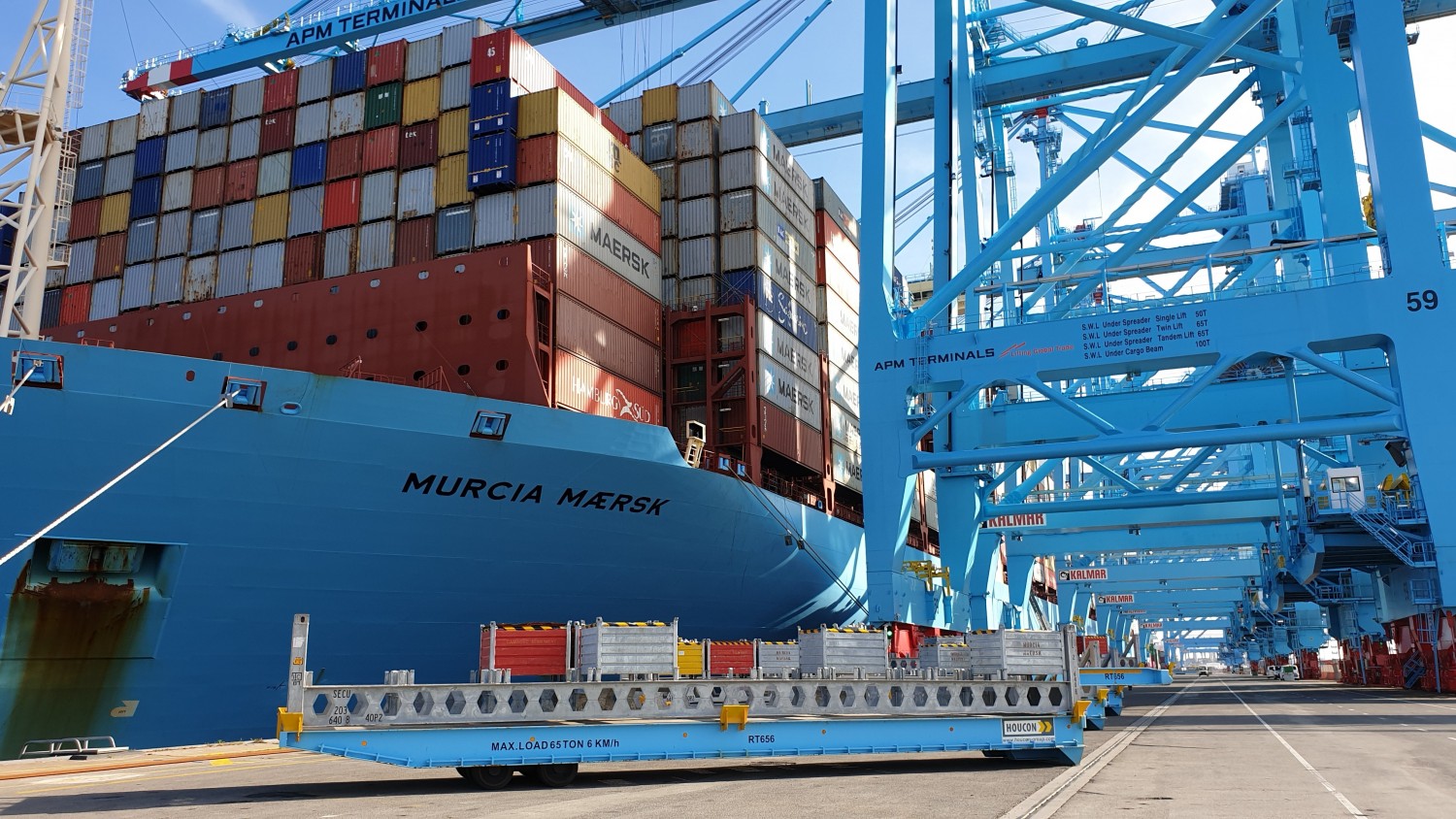Potential intervention by the U.S. federal government into the mounting penalties being levied against freight importers, shippers and forwarders over container delays and backlogs at West Coast ports has taken a major step closer to fruition.
A bi-partisan duo in the Senate, Democrat Amy Klobuchar of Minnesota and Republican John Thune of South Dakota, introduced the Ocean Shipping Reform Act (OSRA) into Congress’ upper chamber in February. That’s after the U.S. House cleared the bill in December with broad bi-partisan support, 364-60.
Chiefly, the legislation seeks to rebalance a market which some perceive to work in the maritime shipping lines’ favor — a dynamic that shippers, freight forwarders, importers, and exporters have said has led to abuses over container rates and fees,and has been a critical underlying current to port gridlock and supply chain disruptions.
OSRA would implement reforms to bolster the Federal Maritime Commission’s (FMC) legal standing to investigate and potentially punish maritime carriers and port terminal operators who charge unfair or excessive penalty fees to cargo owners. It is also intended to shift the burden of justifying so-called demurrage and detention charges to the invoicing parties – and away from the parties being billed.
So, instead of cargo owners being forced to provide documentation for why those fees should be removed or redacted, the onus would be flipped: The shipping lines and terminal operators would need to justify the fees in the first place.
However, while the bill addresses issues that have lingered between port stakeholders for the better part of a half-decade, OSRA’s reforms likely are limited in their ability to meaningfully address the current gridlock or even smooth fee disputes on a longer-term basis.
The devil, in this case, is in the day-to-day detail. The practical process governing disputes must become more robust, centralized and, critically, neutral. Dispute resolution should no longer hinge on carrier-owned data nor flimsy screenshots of communications between carriers and their customers. Better tools are required to properly enforce accountability.

The legislation should punish carriers and operators who charge unfair or excessive fees.
“The carriers view these penalties – whether right or wrong – as a profitable part of their business,” said Brian Glick, CEO and founder of Chain.io, a systems integration platform that works closely with shippers and freight forwarders. “So if this bill passes, they’ll become compliant with the law, but won’t work against their own self-interest. They’re a for-profit entity, and it’s hard to envision them willingly sacrificing a profitable part of their business for what’s perceived to be a moving target of playing fair.”
Detention and demurrage penalties have soared since the pandemic and associated supply chain disruptions hit. Any outstanding demurrage fees must be paid before a shipper can acquire their container from the port. Drayage carriers have often been turned away from picking up loaded imported containers because of unpaid demurrage charges — one of the contributors of delays and slowdowns.
On the flipside, maritime carriers and terminal operators often are rejecting empty containers being brought back to the ports by drayage carriers. Yet the terminals and steamship lines are then charging cargo owners (shippers and freight forwarders, most often) hundreds of dollars per day in detention fees for holding those empties.
With fees mounting for shippers and freight forwarders, industry stakeholders have quipped that the ocean shipping lines are now viewing detention and demurrage fees as their primary business — not transporting cargo. As has been widely reported in recent months, ocean carriers’ profits have soared to record highs the past two years.
To combat this power dynamic, shippers and forwarders need access to agnostic data that enables them to rebut unfair or excessive charges that impede flow of goods and create disputes between port stakeholders. Because even if OSRA becomes law and FMC is granted greater authority to initiate investigations, the agency will still largely need to rely on shippers, forwarders, and drayage truckers to provide a counterbalance and provide accurate, independent data.
“The carriers will not be motivated to go above and beyond to self-identify non-compliant situations. FMC already has some legal authority to investigate carriers for fraudulent or excessive charges,” said Glick. “But it still requires clear data to identify those situations. While there is government lead discussion about common data repositories, the private sector will always have a role to play.”
As it stands now, much of the data needed by shippers or forwarders to hold carriers accountable for excessive or unfair demurrage and detention charges “exists on the servers of the steamship lines,” said Steve Wen, founder and CEO of Dray Alliance, a platform that connects drayage trucking companies with shippers who need to return empty containers and pick up loaded imports.
“What’s really needed are independent data sets,” said Wen. “For FMC to have any ground in providing feedback, they need to have a single source of truth. That’s a good starting point. But from there what’s needed is a framework for the flow of a dispute. What’s the flow of a charge? That part isn’t laid out very clearly, which worries me, because if it’s not clear, there’s room for interpretation from the ocean shipping lines.”
Wen says the key to solving demurrage and detention disputes is to better inform shippers and forwarders with multiple, neutral streams of data. “There needs to be layers of verification,” Wen said. “If everyone’s relying on a single source of data, and that’s from the party charging the fees, that obviously presents some issues.”
For example, he said, platforms like Dray Alliance can use geo-fencing to collect data from drayage drivers’ mobile phones about when they enter a gate and when they exit. That can then be used to verify the data from a maritime shipping line and/or terminal operator about when a container left the terminal gate.
One other knock against OSRA is simply examining it from a practicality standpoint, says Dan Gardner, president of Trade Facilitators, Inc., which consults with shippers and forwarders on supply chain management.
To truly resolve the disputes over demurrage and detention, says Gardner, cargo owners must be aware of who they’re awarding their business to – and to be sure to dole it out only to those using the right tracking, operational visibility and billing technologies.
“If I’m an importer of footwear made in Vietnam, my goal is to take hold of my container so that I can fulfill orders to my customers, whether that’s e-commerce orders or whether the shoes are going to Target or Walmart or wherever,” said Gardner.
But to book an appointment for a truck to pick up that container from the port, all outstanding fees have to be paid. “So even if OSRA took effect tomorrow and there was a beef over unpaid demurrage charges, I’m still probably just going to pay those charges and get my container so that I can keep my products moving, if I’m that footwear importer,” he said. “In the heat of the moment, to get those shoes, how’s that going to work trying to resolve the beef with the shipping line or the terminal? It isn’t.”
“The ultimate resolution is for technology offered within the private market,” said Gardner, “to resolve these issues and re-balance the playing field with the maritime carriers, the terminal operators, and those paying the fees – shippers and logistics providers.”
James Coombes is the co-founder and CEO of Vector.ai, a digital freight forwarding operational ‘headquarters’ that automates and provides actionable visibility for accounts payable, arrival notice, pre-alerts and customs clearance workflows. Coombes has a bachelor’s degree in biochemistry from Imperial College London and MPA from Harvard University. He can be reached at [email protected].
SC
MR


More Ports & Shipping
- Shining light on procurement’s dark purchases problem
- As Red Sea Crisis Drags On, Shippers Eye Alternatives
- Global Container Shipping Industry Sets Sights on Tech Investment, Capacity Concerns
- US Ports to Share $653M in Funding to Improve Throughput, Reduce Emissions
- The Astonishing Port of Laredo
- Navigating the Panama Canal Drought: Tips to Get Your Shipments Moving
- More Ports & Shipping
Latest Podcast

 Explore
Explore
Procurement & Sourcing News
- Israel, Ukraine aid package to increase pressure on aerospace and defense supply chains
- How CPG brands can deliver on supplier diversity promises
- How S&OP provides the answer to in-demand products
- There is still work to do to achieve supply chain stability
- Blooming success: The vital role of S&OE in nurturing global supply chains
- How one small part held up shipments of thousands of autos
- More Procurement & Sourcing
Latest Procurement & Sourcing Resources

Subscribe

Supply Chain Management Review delivers the best industry content.

Editors’ Picks





